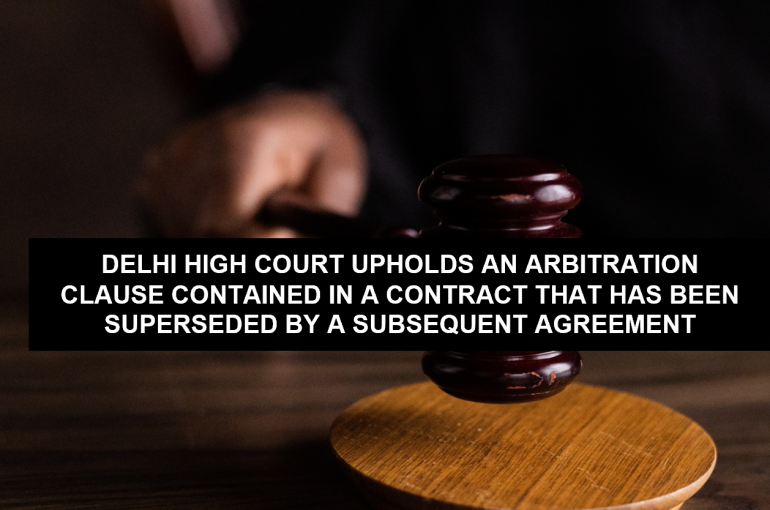DELHI HIGH COURT UPHOLDS AN ARBITRATION CLAUSE CONTAINED IN A CONTRACT THAT HAS BEEN SUPERSEDED BY A SUBSEQUENT AGREEMENT
Recently, Justice Mini Pushkarna of the Delhi High Court passed a Judgment dated 23.11.2022 in PVR Limited V. Imperia Wishfield Private Limited. in Arbitration Petition No. 829/2022, and reiterated that an arbitration clause contained in a contract would survive even though the contract is terminated or superseded by a subsequent agreement.
FACTS
A Memorandum of Understanding (MOU) dated 06.05.2016 was executed between the Parties for entering into an arrangement for operating a multiplex:
- As per Clause 7(n) of the MOU, the Petitioner was to pay a total interest free refundable Security Deposit to the Respondent amounting to Rs.1,65,00,000/-, which was payable in four stages, out of which Rs. 27,50,000/- was paid by the Petitioner within 15 days of signing the MOU to the Respondent.
- The Petitioner further paid Rs. 42,87,085/- to the Respondent on 25.01.2017 out of the second installment of Security Deposit. Therefore, a total amount of Rs. 70,37,085/- was paid by the Petitioner to the Respondent towards Security Deposit.
- Further, Clause 7(y) of the MOU provides for resolution of disputes between the Parties through Arbitration.
- The MOU further provides that the Parties would execute an agreement to lease within 6 months from the date of signing of the MOU and thereafter, execute a lease deed within 60 days of obtaining occupation certificate.
Accordingly, subsequent to the execution of the MOU, a tripartite Agreement to Lease was executed on 18.01.2017 between the Petitioner, the Respondent and Prime IT Solutions Pvt. Ltd. (which was the Confirming Party):
a) As per Clause 6.3 of the Agreement to Lease, the Respondent was liable to refund the Security Deposit amount within a period of 1 month from the date of expiry or termination of the Agreement to Lease.
b) In case, any dispute arose between the Parties, the same would be settled through Arbitration contained in Clause 14 of the Agreement to Lease.
c) In this case, the Respondent failed to perform its part of the obligations as envisaged under the Agreement to Lease.
d) Due to non-performance of obligations by the Respondent, a Mutual Recession and Release Deed dated 23.08.2019 was executed and the MOU and the Agreement to Lease were brought to an end.
e) In furtherance to the terms of the MOU and the Agreement to Lease, it was recorded in the Release Deed that the Respondent would refund to the Petitioner, the Security Deposit amount of Rs.70,37,085/- paid by the Petitioner under the MOU and Agreement to Lease.
f) It was stipulated in the Release Deed that the Respondent would be absolved of all its liabilities towards the Petitioner under the MOU and the Agreement to Lease, following the refund of the Security Deposit by the Respondent to the Petitioner.
g) The Respondent was supposed to refund the said amount towards Security Deposit to the Petitioner within a period of 1 month from the date of execution of the Release Deed i.e. till 23.09.2019. However, the Respondent failed to do so.
h) The Petitioner issued a Letter dated 29.10.2021 to the Respondent requesting the Respondent to refund the amount of Security Deposit along with interest within a period of seven days. However, the Respondent neither replied to the Letter dated 29.10.2021, nor released any amount towards the Security Deposit to the Petitioner.
As disputes had arisen between the Parties towards refund of the Security Deposit in terms of the MOU and the Agreement to Lease, a Notice invoking Arbitration was issued by the Petitioner to the Respondent, wherein the Petitioner invoked the Arbitration Clause as contained in Clause 7(y) of the MOU and Clause 14 of the Agreement to Lease.
REASONING AND ANALYSIS
As no reply was received from the Respondent, the Petitioner filed a Petition under Section 11 (6) of the Arbitration and Conciliation Act, 1996 (Act) seeking appointment of an arbitrator before the Delhi High Court.
The High Court vide Judgement dated 23.11.2022 made the following observations:
1) That pertaining to the issue that whether the rights of the Parties under the MOU and the Agreement to Lease in the present case, have been superseded by a subsequent agreement i.e. the Release Deed, is an arbitrable issue which can be examined by the Arbitrator, as an Arbitral Tribunal is competent to rule on its own jurisdiction, including the existence or validity of the Arbitration Agreement, and as such the said issue cannot be adjudicated at the time of considering a Section 11 Petition filed before the High Court.
2) That in respect of the other issue whether the Arbitration Clause contained in the MoU and the Lease Agreement would survive if the latter is terminated or superseded by a subsequent agreement i.e. the Release Deed, the High Court observed that:
i) That an arbitration clause relates to the resolution of disputes between the parties to a contract and not to the performance of the said contract. Thus, in view of the Doctrine of Severability, an arbitration clause is deemed to be a separate and severable clause. Thus, the arbitration clause would survive even if the principal underlying contract comes to an end.
ii) Hence, even after execution of the Release Deed and the subsequent termination of the MoU and the Lease Agreement, the Arbitration Clause thereunder would survive such termination and thus, any dispute arising out of the MoU and the Lease Agreement can be referred to Arbitration.
Thus, based on the aforesaid observations, the Delhi High Court allowed the Section 11 Petition and appointed a Sole Arbitrator in this case to adjudicate the disputes between the Parties in accordance with the provisions of the Act.
Devashish Kakkar
Legal Associate
The Indian Lawyer





































Leave a Reply